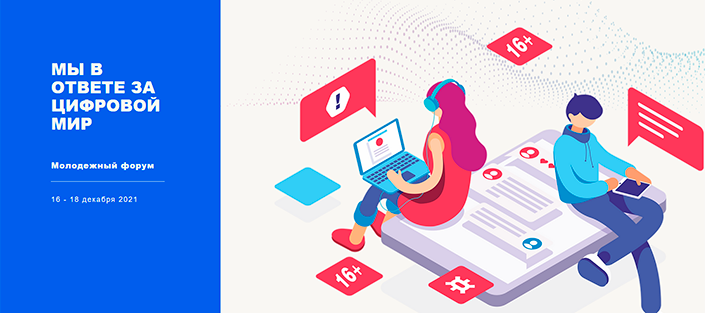
On December 16-18, Moscow is hosting the We are Responsible for the Digital World 2021 Youth Forum, organized by the Moscow Institute of Psychoanalysis, with the Coordination Center for TLD .RU/.РФ as a forum partner. This year, due to the epidemiological situation, the second edition of the forum will be held in a mixed format – limited face-to-face participation and a broadcast on the official YouTube channel of the institute. In total, the forum will involve about 600 people, both online and offline.
At the opening ceremony, the participants were greeted by Alexander Demidov, First Vice-Rector of the Moscow Institute of Psychoanalysis. Professor Galina Soldatova (D.Sc. in Psychology), the head of the Department of Social Psychology at the Moscow Institute of Psychoanalysis and an academician of the Russian Academy of Education, presented a report, Youth Online Practices and Digital Everyday Life: Results of Monitoring.
Andrey Vorobyev, Director of the Coordination Center for TLD .RU/.РФ, spoke about opportunities to boost the digital literacy of students and schoolchildren through games, using the example of the Coordination Center’s educational projects, and presented the Explore the Internet & Govern It! interactive educational project. He spoke in detail about the goals and objectives of the project. “The main task is to tell high school students, junior university students and teachers about the internet governance process. And our main goal is to increase the digital literacy of our audience,” emphasized Andrey Vorobyev.
The Coordination Center’s director noted that today the digital environment has become a livelihood for most people, and the pandemic has accelerated this process. It is easy for most children and adolescents to handle devices, but this does not mean that they use them confidently and safely. Teaching pupils and students the basics of digital literacy will enable them to safely and appropriately manage, understand, integrate, share, evaluate, create and digitally access information to participate in economic and social life. Andrey Vorobyev cited data on the digital literacy index of various social groups in Russia. Thus, the digital literacy index of Russians as a whole is 52 points, and the most literate, surprisingly, were not children and young people, but school teachers and university professors – 87 and 88 points, respectively.
Andrey Vorobyev spoke in detail about the Explore the Internet & Govern It! project. Over the 10 years since its launch, more than 200,000 schoolchildren and students have participated in it. Each year 16,000-20,000 people take part in the Explore the Internet & Govern It! championship. In addition to the championship, the project includes a quiz, educational modules, a glossary of terms, lessons and dictations on digital literacy, and even a mobile application. It is also possible to hold local tournaments on a variety of topics, and the Coordination Center is ready to help in organizing them.
“Teens are characterized by clip-like thinking and dependence on devices, so learning through games is a natural process for them. And despite the outward ease and even light-hearted nature, such an approach is able to interest and captivate them much more than standard lessons,” concluded Andrey Vorobyev.



